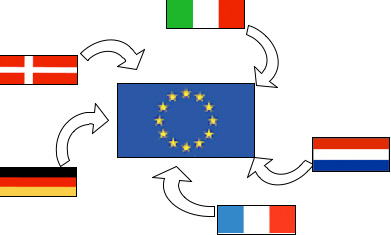Comp. Analysis of Foreign Policies in Europe
Idea

The "Project on Comparative Analysis of Foreign Policies in Europe, short: PAFE" was conducted until May 2002 at the chair of International Relations and Foreign Policy at the University of Trier. It was funded by the DFG (German Research Foundation) and the ASKO Europe Foundation.
The project deals with the opportunities and limitations of EU-foreign policy and aims at identifying factors that boost or prevent the development of a coherent and effective EU-foreign policy. It presupposes that the foreign policy behavior of states, just like the EU's as a collective actor, is substantially shaped by their respective "identity". The country-specific "national identity" is understood as a social construction that is composed of the self-conception of a nationally-organized society in relation and contrast to other nationally-organized societies. The effect of identity on behavior is conceptualized indirectly, hypothesizing that national identity creates a reference frame for domestic discourses that deal with a particular foreign policy behavior. The project's objective is to make a contribution to the analysis of identity in International Relations both in a theoretical-conceptual as well as in an empirical way.
Empirically, the project studies the foreign policies of seven EU member states who differ both with view to material as well as identity and discoursive factors. The eight countries are Denmark, Germany, France, Greece, Great Britain, Italy and the Netherlands, whose foreign policy behavior is compared systematically.
By means of two pertinent historic discourses, the states' national identities were finally assessed. These identities are applied to two cases: the GATT-negotiations of the Uruguay-round and the Kosovo-conflict (see monographies). The behavior- and discourse analyses show to what extent the development of a common European foreign policy - up to a European security and defense identity - is hindered or fostered by identity congruences. Thereby, PAFE integrates into the larger range of topics of European Foreign Policy Analysis and into the comparative analysis of national foreign policies as well as into constructivist-inspired identity research.
Project Results
The PAFE project's direct results have been published in numerous formats. Since the end of the project at the University of Trier various additional publications, which apply the compiled approach, have followed.

